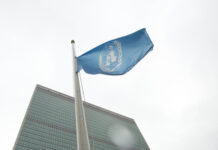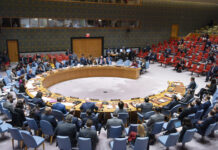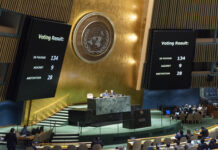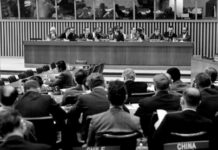Photo credit: DiasporaEngager (www.DiasporaEngager.com).
Representatives of Palestinian factions are traveling to Moscow this week for talks aimed at forging a greater degree of unity, but analysts remained skeptical that the Russian initiative is likely to register progress.
The talks, which are scheduled to begin on Wednesday, will bring together officials of the Islamist terrorist organizations Hamas and Palestinian Islamic Jihad (PIJ) with representatives of PLO factions including Fatah, the Popular Front for the Liberation of Palestine (PFLP) and the Democratic Front for the Liberation of Palestine (DFLP). Announcing the talks last week, Russian deputy foreign minister Mikhail Bogdanov told pro-regime media outlets that “all Palestinian representatives who are located in different countries, in particular in Syria and Lebanon, other countries in the region,” would be invited to the Moscow parley, emphasizing at the same time that Russia’s rulers continue to regard the PLO — the main power in the West Bank-based Palestinian Authority (PA) — as “the sole legal representative of the Palestinian people.”
Several regional policy analysts argued that expectations from the talks should be necessarily limited, especially as Russia has failed in past efforts to bring rival Palestinian factions closer together.
“Russia does not have any road map for the Palestinian file, especially for the Gaza Strip as it would be necessary to have mediation functions and maintain good contacts with both Israel and the paramilitary wing of Hamas in Gaza,” Ruslan Suleymanov — an independent Middle East expert based in Baku, Azerbaijan — told the German broadcaster DW on Monday.
Suleymanov said that the talks were primarily an opportunity for Russian President Vladimir Putin to showcase Russia’s geopolitical clout amid its ongoing invasion of Ukraine and with elections — which Putin is expected to win easily — on the calendar in March.
“It’s really just dialogue for dialogue’s sake,” Suleymanov remarked.
Hugh Lovatt — senior policy fellow with the Middle East and North Africa Program at the European Council on Foreign Relations — offered a similar perspective.
“This Russian summit is a way to show that Russia has the diplomatic capacity to play a hands-on role in supporting Palestinian national unity,” he told DW. However, previous reconciliation talks that were hosted in Moscow, Algiers and Cairo have “also not succeeded in brokering a lasting reconciliation deal between the rivals,” he said.
A potential obstacle to the talks emerged on Monday with the resignation of the PA’s Prime Minister, Muhammad Shtayyeh, who had enthusiastically backed the Moscow talks in a speech at the Munich Security Conference earlier this month. The PA has been under increasing pressure from the US to form a more representative government that would be in a position to manage the Gaza Strip once hostilities end.
“The decision to resign came in light of the unprecedented escalation in the West Bank and Jerusalem and the war, genocide and starvation in the Gaza Strip,” Shtayyeh told PA President Mahmoud Abbas in a formal letter.
“I see that the next stage and its challenges require new governmental and political arrangements that take into account the new reality in Gaza and the need for a Palestinian-Palestinian consensus based on Palestinian unity and the extension of unity of authority over the land of Palestine,” he added.
A Hamas spokesman told the Saudi channel Al Arabiya on Sunday that the terrorist group wants to form “an impartial national government based on the consensus of the Palestinian factions,” adding that the talks in Moscow would focus only on “a certain period and clear tasks.”
Separately, Hamas politburo member Muhammad Nazzal told the pro-Hamas website Middle East Monitor that the Moscow meeting was necessary because there had been “no official communication” with the PA on the subject of post-war planning.
Nazal claimed in the same interview that Hamas remained a powerful force in the Gaza Strip, where it continues to hold hostage more than 100 of the 240 people seized during its pogrom in southern Israel on Oct. 7. “Rumours of Rafah in the south of being the last stronghold of Hamas are false; the resistance exists across the entire Gaza Strip,” Nazzal said. “Moreover, the movement is fighting a fierce political negotiating battle, no less than the battle it is waging on the ground.”
Source of original article: World – Algemeiner.com (www.algemeiner.com).
The content of this article does not necessarily reflect the views or opinion of Global Diaspora News (www.GlobalDiasporaNews.com).
To submit your press release: (https://www.GlobalDiasporaNews.com/pr).
To advertise on Global Diaspora News: (www.GlobalDiasporaNews.com/ads).
Sign up to Global Diaspora News newsletter (https://www.GlobalDiasporaNews.com/newsletter/) to start receiving updates and opportunities directly in your email inbox for free.
































